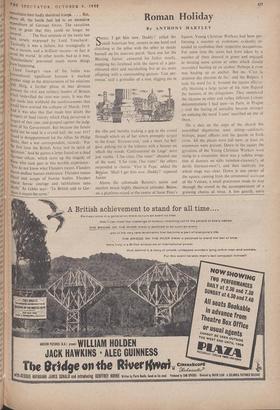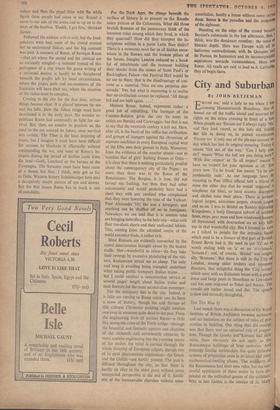Roman Holiday
By ANTHONY HARTLEY
'CI HALL I get him now, Daddy?' yelled the asmall American boy, camera in one hand and clutching at the pillar with the other to steady himself on his insecure perch. 'Save one for the Blessing, Junior,' answered his father stoutly, mopping his forehead with the sleeve of a jazz- Coloured shirt and marshalling five or six more offspring with a commanding gesture. 'Con per- messo,' said a grenadier of a nun, digging me in the ribs and thereby making a gap in the crowd through which six of her sisters promptly surged to the front. 'Excusez-moi,' said a short, fat Bel- gian, poking me in the kidneys with a banner on which the words 'Confraternite de Liege' were just visible. `L'ho visto, l'ho visto!' shouted one of the nuns. 'L'ho visto. l'ho visto!' the others responded in chorus. 'Vive le Pape,' added the Belgian. 'Shall I get him now, Daddy?' repeated Junior.
Above the colonnade Bernini's saints and martyrs struck highly theatrical attitudes. Below, on a.platform raised in the centre of Saint Peter's Square, Young Christian Workers had:been per- forming a number of evolution S evidently in- tended to symbolise their respective occupations. For some time the scene had been taken by a number of them dressed in green and engaged in miming some action or other which closely resembled hauling up an anchor. Perhaps it even was hauling up an anchor. But no. 'C'est Ia jeunesse des chemins de fer,' said the Belgian. I took his word for it. Around the square eller:at- ally blocking a large sector of the view flapped the banners of the delegations. They completed the likeness to other and rather different Labour demonstrations I had seen—in Paris, in Prague —and the feeling of unreality became stronger on noticing the word 'Luton' inscribed on one of them.
On a dais on the steps of the church the assembled dignitaries were sitting—cardinals, bishop, papal officers and the guards to flank them. All the places were full now; at least six eminences were present. Down in the square the gyrations of the Young Christian Workers were rising to a crescendo; there was a sudden irrup- tion of dancers on stilts (window-cleaners?), of devils (furnace-men?), and then suddenly the whole stage was clear. Down in one corner of the square, coming from the ceremonial staircase of the Vatican, a small procession made its way through the crowd to the accompaniment of a growing chorus of vivas. A few guards, some
ushers and then the papal litter with the while figure these people had come to see. Round it came to our side of the arena and so up on to the steps of the basilica. 'Daddy, I got him,' shrieked Junior.
Followed the address urbi et orbi, but the loud- speakers were bad, most of the crowd seemed not to understand Italian, and the big moment was past. A moment of Rome, of baroque Rome —that art where the sacred and the comical are so curiously mingled—a moment typical of this palimpsest of a city where the grave writing of a universal destiny is hardly to be deciphered beneath the graffiti left by local circumstance, where the pagan gods and sea-monsters of the fountains will have their say, where the emotion of the visitor must be complex.
Coming to the city for the first time, certain things become clear. It is placed between the sea and the hills. How the Alban range must have dominated it in the early days. No wonder re- publican Rome had continually to fight for sur- vival. But, then, no wonder its position on the road to the sea assured its future, once survival was certain. The Tiber is the least-inspiring of rivers, but I imagine it must have been difficult for anyone to blockade it effectually without commanding the sea, and most of Rome's be- siegers during the period of decline came from the land—Goth, Lombard or the barons of the Campagna. The Saracens must have been more of a threat, but they, ,I think, only got as far as Ostia. Western history kaleidoscopes here into a deceptively simple pattern of ups and downs. But the first lesson Rome has to teach is one of mutability. For the Dark Ages, the plunge beneath the surface of history is as present as the Renais- sance palaces or the Colosseum. What did those brutish Romans of the pornocracy think of the immense ruins among which they lived, in which they quarried? How did they interpret the in- scriptions written in a purer Latin than theirs? There is a momento inori for us all hidden some- where in the flowers and the broken pillars of the forum. Imagine London reduced to a hand- ful of, inhabitants and the remnant building their shacks from the stones of Saint Paul's or Buckingham Palace—the Festival Hall would be no use to them; that is the disadvantage of con- crete as a material. `Nox est una perpetua dor- mienda.' Yes, but what is reassuring is to realise that no civilisation cannot be replaced. 'All things fall and are built again. . .
Modern Rome, indeed, represents rather a good job of rebuilding. The baroque of the Counter-Reform gives the city its tone; its artists are Bernini and Caravaggio; but that is not to say that the twentieth century is left out. Here, after all, is the heart of the coffee-bar civilisation, and groups of loungers against the chromium of espresso machines in every European capital west of the Elbe owe their genesis to Italy. Moreover, from the evidence of the smarter streets—not to mention that of girls' bathing dresses at Ostia— it is clear that there is nothing particularly prudish about the contemporary city of the Popes : no more than there was in the Rome of the Renaissance. The Borgias, it is true, did not favour sea bathing, but then they had other amusements and would probably have had a short way with any cardinal who complained that they were lowering the tone of the Vatican. Poor Alexander VII He was a foreigner, and anything can be shuffled off on to foreigners. Nowadays we are told that it is tourists who are bringing indeceitcy to the holy city—what with their too-short shorts and their atoll-sized bikinis. This, coming from the admitted centre of the world narcotics trade, is rather rich.
Most Romans are evidently unworried by the moral deterioration brought about by the tourist traffic. Nor—wonderful to relate—do they take their revenge by excessive plundering of the visi- tors. Restaurants struck me as cheap. The only real snag is avoiding being trampled underfoot when taking public transport. Italian trains . . . but I could conduct a commination service at several pages' length about Italian trains and their horrors for the mere second-class passenger.
For the antiquary this is the city. Indeed, it is little use coming to Rome unless you do have a sense of history, though the odd flavour of this cultural Christmas pudding might awaken one even in someone quite dead to the past. From the engineering feats of ancient Rome—a little like seeing the ruins of the Forth bridge—through the beautiful and fantastic squares and churches of the sixteenth and seventeenth centuries to more modern engineering like the yawning spaces of the station the mind is carried through the whole diversity of European culture, though two of its most characteristic expressions—the Greek and the Gothic—are hardly present. The past is diffused throughout the city, so that there is hardly an alley in the older parts without some unexpected perspective at the end of it, hardly one of the innumerable churches without some association, hardly a house without some carved door,. Rome is the paradise and the purgatotf of the sightseer. Standing on the edge of the crowd beneath Bernini's colonnade in the hot afternoon, that, I, think, was the dominant emotion : the sense or historic depth. Here was Europe with all its ludicrous contradictions, with its Quixotes old its Pansas, its humanism and its inconsequential aspirations towards transcendence. Here Rome. All roads are said to lead to it. Certain* they all begin there.























































 Previous page
Previous page